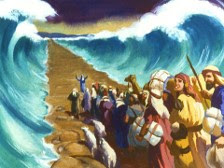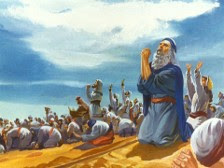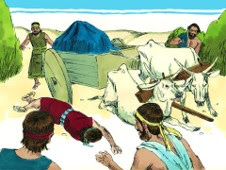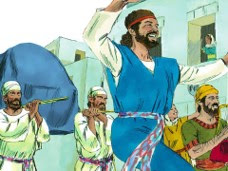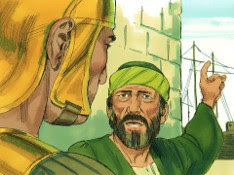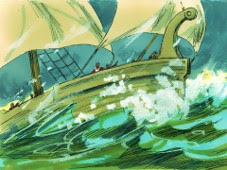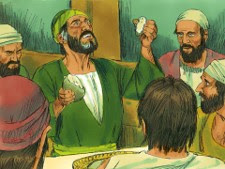Good morning!
Greetings in the name of Father, Son and Holy Spirit.
Let them give thanks to the LORD for his unfailing love and his wonderful deeds for mankind, for he satisfies the thirsty and fills the hungry with good things. (Psalm 107:8-9)
After crossing the Red Sea, the Israelites together as a single voice gave one of the greatest thanksgivings to God. The Egyptians — all of Pharaoh’s horses, chariots, and charioteers—chased the Israelites, and the Israelites could not any further because of the Red Sea blocking their further movement. The Israelites were trapped in between the mighty Pharaoh’s armies and the Red Sea. As Moses raised his hand over the sea, and God opened up a path through the water with a strong east wind. So the people of Israel walked through the middle of the sea on dry ground, with walls of water on each side! But the Pharaoh’s armies continued chased the Israelites.
When all the Israelites had reached the other side,
God said to Moses, “Raise your hand over the sea again. Then the waters will rush back and cover the Egyptians and their chariots and charioteers.” (Exodus 14:26b)
So as the sun began to rise, Moses raised his hand over the sea, and the water rushed back into its usual place. The Egyptians tried to escape, but God swept them into the sea. Then the waters returned and covered all the chariots and charioteers—the entire army of Pharaoh. Of all the Egyptians who had chased the Israelites into the sea, not a single one survived.
The people of Israel had walked through the middle of the sea on dry ground, as the water stood up like a wall on both sides. That is how God rescued Israel from the hand of the Egyptians that day. And the Israelites saw the bodies of the Egyptians washed up on the seashore. When the people of Israel saw the mighty power that God had unleashed against the Egyptians, they were filled with awe before him. Then they gave the highest praise to God. The entire nation was in great joy and gave the greatest thanksgiving to God.
No more. Yes, no more. There was no more Egyptians, who were so fearful.
And a new day was dawn. The long nightmare had vanished.
They saw the end of the Egyptians before their own eyes. The corps were washed up on the sea shore.
The thundering sound scared the Egyptians, and the crushing water fell on them, which was the prelude of their utter destruction.
No more, and no more. They could not find the Egyptians anymore because a new day was dawn.
King David was chosen by God after King Saul sinned against God. Bible describes:
After removing Saul, he made David their king. God testified concerning him: ‘I have found David son of Jesse, a man after my own heart; he will do everything I want him to do.’ (Acts 13:22)
God blessed King David, and he was victorious in every aspect. His kingdom was strengthened under his kingship. The entire nation was prospering, and the people were in joy. Then King David decided to bring in the Ark of God to Jerusalem.
Then King David gathered all the elite troops in Israel, 30,000 in all. He led them to Baalah of Judah to bring back the Ark of God. They placed the Ark of God on a new cart and brought it from Abinadab’s house, which was on a hill. Uzzah and Ahio, Abinadab’s sons, were guiding the cart that carried the Ark of God. Ahio walked in front of the Ark. David and all the people of Israel were celebrating before God, singing songs and playing all kinds of musical instruments—lyres, harps, tambourines, castanets, and cymbals. All well planned and prepared to bring the Ark of God into Jerusalem, and everything seemed going well.
But when they arrived at the threshing floor of Nacon, the oxen stumbled, and Uzzah reached out his hand and steadied the Ark of God. Then God’s anger was aroused against Uzzah, and God struck him dead because of this. So Uzzah died right there beside the Ark of God. David was now afraid of God, and he asked, “How can I ever bring the Ark of God back into my care?” So David decided not to move the Ark of God into the City of David, Jerusalem. The Ark of God remained there in Obed-edom’s house for three months, and God blessed Obed-edom and his entire household.
King David prepared everything that he could including the elite 30,000 troops and the new finest cart, but it was not God’s time. The move of the ark had stopped. During the move, there was a casualty. This made King David in fear, but soon he realized that he had to humbly wait for God’s time.
Then King David was told, “God has blessed Obed-edom’s household and everything he has because of the Ark of God.” So David went there and brought the Ark of God from the house of Obed-edom to the City of David with a great celebration.
For this time, King David was a different person. Rather than trying to move the ark with his own strength by deploying his elite 30,000 troops and the finest cart, he focused on God only.
After the men who were carrying the Ark of God had gone six steps, David sacrificed a bull and a fattened calf. He gave praises to God every six steps. And David danced before the LORD with all his might, wearing a priestly garment.
King David humbled himself before God, and he danced before God in joy. Rather than being a king of the nation, he was a servant of God, who truly rejoiced in God’s presence, mercy and grace. Indeed, his people were also in joy. So David and all the people of Israel brought up the Ark of God with shouts of joy and the blowing of rams’ horns. As soon as David stepped into Jerusalem, he gave the highest thanksgiving to God because God was with him and residing in Jerusalem, the city of David.
David was in joy because God was with him.
The people in joy because God was with them.
The city of David was in joy because the Ark of God was in the city.
David was with God, and so the people was.
Sing to the Lord a new song;
sing to the Lord, all the earth
.
Sing to the Lord, praise his name;
proclaim his salvation day after day.
Declare his glory among the nations,
his marvelous deeds among all peoples. (Psalm 96:1-3)
Apostle Paul heard God’s voice for him to go Rome to witness Him. He boldly proclaimed Jesus before all people including king and governors. Paul appeal to Caesar before Festus, a newly arrived governor, and Paul was allowed to be sent to Rome. Paul and several other prisoners were placed in the custody of a Roman officer named Julius, a captain of the Imperial Regiment, and all set sail for Rome. Initially, the weather was good and the wind was quite favorable. Soon the weather was not so cooperating. After serval days of slow sailing, the wind was against the sailing. The weather was becoming dangerous for sea travel, and Paul spoke to the ship’s officers.
“Men,” he said, “I believe there is trouble ahead if we go on—shipwreck, loss of cargo, and danger to our lives as well.” But the officer in charge of the prisoners listened more to the ship’s captain and the owner than to Paul. (Acts 27:10-11)
When a light wind began blowing from the south, the sailors thought they could make it. So they pulled up anchor and sailed close to the shore of Crete. But the weather changed abruptly, and a wind of typhoon strength (called a “northeaster”) burst across the island and blew us out to sea. The sailors couldn’t turn the ship into the wind, so they gave up and let it run before the gale. Although Paul told the eminent danger, nobody heard. Paul and the rest of the people were in the storm called northeaster.
The sailors bound ropes around the hull of the ship to strengthen it. They lowered the sea anchor to slow the ship and were driven before the wind. The next day, as gale-force winds continued to batter the ship, the crew began throwing the cargo overboard. The following day they even took some of the ship’s gear and threw it overboard. The sailors did everything that could. However, the terrible storm raged for many days, blotting out the sun and the stars, until at last all hope was gone. Although Paul warned, nobody heard. All including Paul was in danger.
As a result, no one had eaten for a long time. Finally, Paul called the crew together and said, “Men, you should have listened to me in the first place and not left Crete. You would have avoided all this damage and loss. But take courage! None of you will lose your lives, even though the ship will go down. For last night an angel of the God to whom I belong and whom I serve stood beside me, and he said, ‘Don’t be afraid, Paul, for you will surely stand trial before Caesar! What’s more, God in his goodness has granted safety to everyone sailing with you.’ So take courage! For I believe God. It will be just as he said. But we will be shipwrecked on an island.”
Just as day was dawning, Paul urged everyone to eat. “You have been so worried that you haven’t touched food for two weeks,” he said. “Please eat something now for your own good. For not a hair of your heads will perish.” Then he took some bread, gave thanks to God before them all, and broke off a piece and ate it. (Acts 27:33-35)
Please think about the scene when Paul took bread and gave thanks to God. Paul and the rest of the people were still in the storm. Nobody could physically see how they would be rescued from the storm, but before the faith of Paul, all together gave thanksgiving to God and eat.
After the meal, the storm did not die out, and the ship aground. The bow of the ship stuck fast, while the stern was repeatedly smashed by the force of the waves and began to break apart. Then the commanding officer ordered all who could swim to jump overboard first and make for land. The others held on to planks or debris from the broken ship. So everyone escaped safely to shore.
As God told to Paul, all escaped safely to shore from the storm. Paul in faith gave thinks to God in the storm, and God guided Paul and the people with him safely to an island. Indeed, the people of the island were very kind and made a fire on the shore to welcome Paul and the people rescued from the ship.
We saw three thanksgivings in Bible:
1. Thanksgiving while watching corps of the Egyptians washed up on the sea shore. They were saved from the death that could have been brought by the Egyptians.
(Thanksgiving to God for what He had done – the past act of God.)
2. King David gave thanksgiving in extreme joy as the Ark of God was entering in Jerusalem. He danced like a child before God who raised up David after the first miserable failure.
(Thanksgiving to God for what He was doing – the present act of God.)
3. Paul gave thanksgiving in storm with the people in faith while still being battered by the gale-force winds.
(Thanksgiving to God for what He would do – the future act of God)
All of the above forms of thanksgiving are equally precious before God. Thus, we can give thanks to God in all circumstances in faith. Who is our God? He is our Ever-Loving Father, who dearly loves us. Then what should we do? Yes, we praise Him and give thinks to Him in all circumstance, which is our faith and also hope in our lives.
Rejoice always, pray continually, give thanks in all circumstances; for this is God’s will for you in Christ Jesus. (1 Thessalonians 5:16-18)

